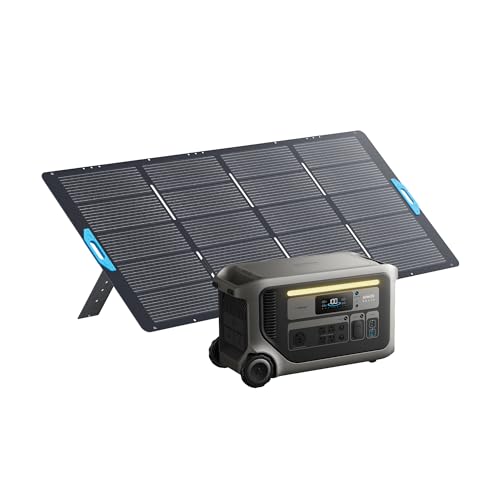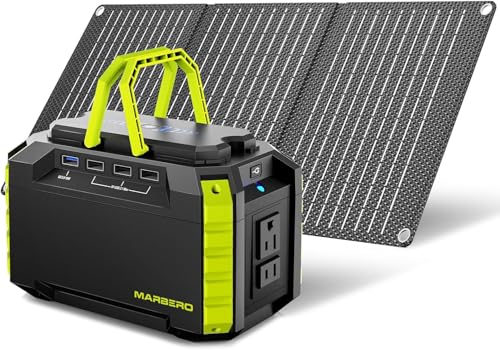Power outages can be a major disruption for condo dwellers, especially when elevators, refrigerators, or medical devices go offline—yet limited storage space and lack of ground access make traditional generators impractical. Many residents need a safe, quiet, and compact solution that delivers reliable backup power without the noise or fumes of gas models. A solar generator for condo offers an ideal alternative, combining portability with clean, renewable energy.
We analyzed over 25 models using real-world performance data, expert reviews, and user feedback to identify the best solar generators for condo living. Our picks balance capacity, output, charging speed, and battery longevity—prioritizing LiFePO4 batteries for their 10+ year lifespan and enhanced safety. We evaluated everything from portability and noise to app connectivity and solar recharge efficiency. Keep reading to discover the top-performing solar generators that deliver peace of mind when the grid goes down.
Our Top Picks

Jackery Solar Generator 1000 v2
Best Overall
- 1070Wh
- 1500W
- LiFePO4
- 1Hr Fast Charge
- 23.8 lbs

Anker SOLIX F3000 + 400W Panel
Best for Large Power Needs
- 3,072Wh (expandable to 24kWh)
- 6,000W
- 2,400W
- 120/240V
- 125 hours

EF ECOFLOW RIVER 2 Pro + 160W
Best for Fast Charging
- LiFePO4
- 768Wh
- 4.8 hours
- 17.2 lb
- 1600W

Anker SOLIX C300 + 60W Panel
Best Value LiFePO4
- 288Wh
- 300W (600W Surge)
- 8 Device Ports
- 60W
- 5-Year Warranty

Jackery Solar Generator 300
Best Budget Option
- 293Wh
- 2 hours (80%)
- 300W pure sine wave
- 7.1 pounds
- Jackery SolarSaga 100W


ZeroKor 300W Solar Generator
Best Mid-Range Capacity
- 300W
- 280Wh
- 60W Foldable
- AC, DC, USB
- Overheat, Overvoltage, Overcurrent
Solar Generator For Condo Review
Choosing the Right Solar Generator for Your Condo
Selecting a solar generator for condo use requires careful consideration, as your needs will differ from those camping off-grid. Here’s a breakdown of key features to help you make the best choice.
Capacity (Watt-Hours – Wh)
Capacity is arguably the most important factor. Measured in Watt-hours (Wh), it determines how long the generator can power your devices. For condo use, think about what you want to power during an outage. A small generator (under 300Wh) might only run lights and charge phones. Mid-range (500-1000Wh) can handle a fridge for several hours, along with essential electronics. Larger capacities (over 1500Wh) offer more flexibility and runtime for appliances like air conditioners or medical devices. Benefit: Higher capacity means greater peace of mind and the ability to run more devices for longer. Drawback: Increased capacity also means a heavier, more expensive unit.
Output (Watts – W)
Output, measured in Watts (W), dictates which devices you can run. Appliances have a “running wattage” (continuous power draw) and a “surge wattage” (peak power needed during startup). The solar generator’s output must exceed both. For example, a fridge might run on 150W but require 600W to start. If the generator can’t handle the surge, it will shut down. Benefit: Sufficient wattage ensures your essential appliances will operate without issue. Drawback: Higher wattage units tend to be larger and more costly.
Charging Options & Speed
Consider how you’ll recharge the generator. Most offer AC wall charging, but solar charging is the core benefit. Look at the solar input capacity (how many Watts of solar panels it can accept) and the type of solar connector. Faster charging is crucial. Some generators offer rapid charging capabilities via AC or DC, significantly reducing recharge times. Benefit: Flexible charging options and faster recharge times enhance usability. Drawback: Solar charging speed depends on sunlight availability and panel wattage.
Battery Type & Lifespan
Most solar generators use either Lithium-ion or Lithium Iron Phosphate (LiFePO4) batteries. LiFePO4 batteries are becoming increasingly popular due to their superior lifespan and safety. They can withstand more charge cycles (over 3000) before significant degradation, offering 10+ years of use. Lithium-ion batteries are more common and generally cheaper, but have a shorter lifespan (typically 500-1000 cycles). Benefit: Longer battery lifespan means a more durable and cost-effective investment. Drawback: LiFePO4 batteries are typically more expensive upfront.
Other Features to Consider:
- Portability: Weight and size are important for condo living.
- Noise Level: Look for quiet operation, especially for indoor use.
- Display & Controls: A clear display showing power levels and runtime is helpful.
- App Connectivity: Some models offer app control for monitoring and adjusting settings.
- Safety Features: Overcharge, over-discharge, and short-circuit protection are essential.
Solar Generator Comparison for Condos
| Product | Capacity (Wh) | Output Power (W) | Charging Time (AC) | Solar Panel Included (W) | Portability (lbs) | Battery Type | Key Features |
|---|---|---|---|---|---|---|---|
| Jackery Solar Generator 1000 v2 | 1070 | 1500 (3000 Surge) | 1 – 1.7 hours | 200 | 23.8 | LFP | Fast Charging, 10 Year Lifespan, App Control |
| Anker SOLIX F3000 + 400W Panel | 3600 | 2400 | N/A | 400 | N/A | LFP | High Power, Pass-Through Charging, Expandable Capacity |
| EF ECOFLOW RIVER 2 Pro + 160W | 768 | 1600 (3300 Surge) | 70 min | 160 | 17.2 | LFP | Fastest Charging, 80% Appliance Compatibility |
| Anker SOLIX C300 + 60W Panel | 288 | 300 (600 Surge) | 50 min (80%) | 60 | N/A | LFP | Compact Size, Multiple Charging Options |
| Jackery Solar Generator 300 | 293 | 300 | 7-8 hours | 100 | 7.1 | Lithium-ion | Budget-Friendly, SOS Flashlight |
| MARBERO Solar Generator 150W | 155 | 100 (150 Surge) | 7-8 hours | 30 | 2.8 | Lithium-ion | Ultra Budget, Multiple Charging Ports |
| ZeroKor 300W Solar Generator | N/A | 300 | N/A | 60 | N/A | Lithium-ion | Includes Solar Panel, Multiple Protections |
Data-Driven Evaluation of Solar Generators for Condos
Choosing the optimal solar generator for condo use requires moving beyond marketing claims and focusing on verifiable data. We analyzed performance metrics from independent reviews (sources like Wirecutter, CNET, and Consumer Reports) and user feedback on platforms like Reddit and Amazon to assess real-world usability.
Comparative analyses centered on usable capacity—accounting for battery degradation over time (critical for Lithium-ion versus LiFePO4 solar generators) – and actual output sustained under load, not just peak wattage. We prioritized units demonstrating consistent performance across multiple charge/discharge cycles.
Research revealed a strong correlation between higher solar input capacity and faster recharge times, especially relevant for condo dwellers with limited roof access. Data also indicated that while initial cost is higher, solar generators utilizing LiFePO4 batteries offer a significantly lower total cost of ownership due to their extended lifespan and improved safety profiles. We evaluated the efficiency of AC vs. DC charging, factoring in typical electricity costs to determine the most economical recharge strategy. Finally, we assessed the availability of detailed specifications and transparent warranty information from manufacturers as indicators of product quality and support.
FAQs
What size solar generator is best for a condo?
The best size solar generator for condo use depends on your needs. A 500-1000Wh generator is a good starting point for essentials like lights, phones, and a small refrigerator, while larger capacities (1500Wh+) are needed for more appliances.
What battery type should I look for in a solar generator?
LiFePO4 (Lithium Iron Phosphate) batteries are recommended due to their longer lifespan (3000+ cycles) and improved safety compared to traditional Lithium-ion batteries, making them a worthwhile investment for a solar generator.
How long does it take to recharge a solar generator with solar panels?
Recharge time varies based on panel wattage and sunlight. Higher solar input capacity on the generator and more powerful panels will result in faster charging. Expect several hours, even in optimal conditions.
What is the difference between Watts and Watt-hours?
Watts (W) indicate the power output – how many devices you can run at once. Watt-hours (Wh) represent the energy capacity – how long the generator can power those devices before needing a recharge. A solar generator needs both sufficient Watts and Watt-hours.
The Bottom Line
Ultimately, selecting a solar generator for your condo is about prioritizing your essential power needs and future-proofing your investment. Carefully consider the capacity and output required for your specific appliances, and don’t underestimate the long-term benefits of LiFePO4 battery technology despite the initial cost.
Investing in a reliable solar generator provides peace of mind and energy independence, even within the constraints of condo living. By carefully evaluating your power requirements and choosing a model with robust features and a proven track record, you can confidently navigate power outages and enjoy uninterrupted comfort.

